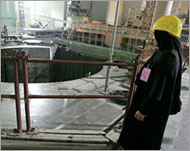Iranian nuclear restart alarms EU3
Britain says it is deeply concerned by Iran’s decision to restart its nuclear programme, while France described the tone of Tehran’s rejection of EU proposals as alarming.

The two European Union allies were responding to Iran’s decisions to resume work at a uranium conversion plant near the central city of Isfahan and to reject a package of EU proposals aimed at solving the stand-off over Iran’s nuclear plans.
Tehran’s defiance is likely to land it in trouble at an emergency meeting of the UN atomic watchdog, the International Atomic Energy Agency (IAEA), in Vienna on Tuesday.
EU officials have warned Iran the resumption of its nuclear programme could result in a referral to the UN Security Council for possible sanctions.
“We regret Iran’s decision to reject the E3’s proposals and are deeply concerned about reports that Iran has also decided to restart the uranium conversion facility at Isfahan,” British Foreign Office Minister Ian Pearson said.
“We will discuss next steps in the IAEA board of governors tomorrow.”
Moving forward
Britain, France and Germany have formed a group of three (E3) to resolve the dispute.
French Foreign Minister Philippe Douste-Blazy said Iran’s resumption clearly violated an accord made in Paris last year, when Tehran agreed to suspend all nuclear activity as a confidence-building measure.
 |
|
Iran’s actions could lead to |
Douste-Blazy added that Tehran’s tone was alarming.
“Today Iran took two serious and worrying unilateral decisions,” he told France Info radio.
“We just received a negative response to the proposals we made. Iran’s tone is particularly alarming and contrary to the spirit of dialogue we have had … over the last two years.
“Iran has never been able to explain the necessity of proceeding with the conversion and the enrichment of uranium,” he added. “It’s a new situation that only makes us increase our doubts over the aims of the Iranian programme.”
The Europeans have taken a softer line with Iran than has the United States, which says Iran’s nuclear programme is a front for bomb-making.
Iran denies the US accusations, saying it needs nuclear power as an alternative energy source to meet booming electricity demand. It says nuclear power would allow it to preserve its oil and gas reserves for export.